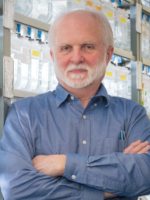A. James Hudspeth

From The Rockefeller University:
A. James Hudspeth, a Rockefeller neuroscientist who discovered how sound waves are converted into electrical signals in the ear’s cochlea, died Saturday at his home in Manhattan. A pioneering scientist and dedicated mentor, he was the university’s F. M. Kirby Professor, head of the Laboratory of Sensory Neuroscience, and director of the F. M. Kirby Center for Sensory Neuroscience. He was also an investigator of the Howard Hughes Medical Institute since 1993. He was 79.
Hudspeth devoted his career to uncovering the fundamental mechanisms of hearing, revolutionizing our understanding of how sound is transformed into perception. By combining biophysical and molecular approaches, innovative experimental techniques, and quantitative mathematical modeling, his contributions have deepened our understanding of the molecular underpinnings of the remarkable sensitivity, frequency selectivity, and dynamic range of vertebrate hearing, laying the groundwork to understand and ultimately address hearing impairment.
“While Jim’s brilliant research inspired scientists everywhere, we knew him personally as a passionate investigator, deeply committed to his work and equally enthusiastic to share the wonders of science with children,” says Richard P. Lifton, Rockefeller’s president. “He was known for his quick wit and as a generous mentor to students and postdocs, a thoughtful advisor to colleagues across the campus and a fabulous communicator of complex scientific concepts to lay audiences. His deep intellect, integrity and insistence on rigor set a standard for excellence that extended across our campus.”
Born in Texas, Hudspeth obtained his B.A., M.D. and Ph.D. in neurobiology from Harvard. Following postdoctoral research at the Karolinska Institute and Harvard Medical School, he had successive faculty appointments at the California Institute of Technology, the University of California San Francisco, and the University of Texas Southwestern Medical Center prior to joining Rockefeller in 1995.
Throughout his career, Hudspeth’s peers awarded him many of the highest honors in science. He was elected to the National Academy of Sciences, the National Academy of Medicine, the American Academy of Arts and Sciences, and the American Philosophical Society. He was awarded the Kavli Prize in Neuroscience, the Ralph W. Gerard Prize from the Society for Neuroscience, the Guyot Prize from the University of Groningen, and the W. Alden Spencer Award from Columbia University, among other prizes.
At the time of his death, Hudspeth was pursuing new approaches to restoring hearing through hair cell regeneration, and his lab had recently published work demonstrating the first method for keeping a mammalian cochlea alive outside of the body—an innovation that will provide future researchers with an unprecedented means for studying the cochlea’s live biomechanics.
“We will remember and continue to be inspired by Jim’s integrity, his humility, and his unwavering commitment to discovery. We are fortunate to have had his presence and leadership at Rockefeller for so many years,” Lifton says.
Hudspeth is survived by his wife Maurine and his children James and Annie.
Donations in his memory may be made to the Hudspeth Fund for Science Outreach in recognition of his love of teaching and passion for science outreach.





















